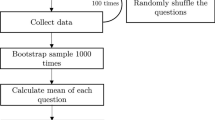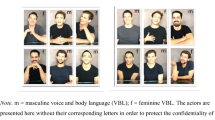Abstract
Employing a two-by-two factorial design that manipulates whether dictator groups are single or mixed-sex and whether procedures are single or double-blind, we examine gender effects in a standard dictator game. No gender effects were found in any of the experimental treatments for the mean or median levels of giving, or for the propensity to give nothing. However, females chose to give away half of their endowments with greater frequency than males in the pooled single-sex treatments.
Similar content being viewed by others
References
Andreoni, J., & Vesterlund, L. (2001). Which is the fair sex? Gender differences in altruism. Quarterly Journal of Economics, 116(1), 293–312.
Ben-Ner, A., Kong, F., & Putterman, L. (2004). Share and share alike: gender-pairing, personality, and cognitive ability as determinants of giving. Journal of Economic Psychology, 25(5), 581–589.
Bolton, G., & Katok, E. (1995). An experimental test for gender differences in beneficent behavior. Economics Letters, 48(3–4), 287–292.
Bolton, G., & Ockenfels, A. (2000). ERC: a theory of equity, reciprocity, and competition. American Economic Review, 90(1), 166–193.
Boschini, A., Muren, A., & Persson, M. (2009). Constructing gender in the economics lab. www.ne.su.se/paper/wp09_15.pdf. Accessed 19 April 2010.
Camerer, C. F. (2003). Behavioral game theory: experiments on strategic interaction. Princeton: Princeton University Press.
Charness, G. (2000). Responsibility and effort in an experimental labor market. Journal of Economic Behavior and Organization, 42(3), 375–384.
Charness, G., & Rabin, M. (2002). Understanding social preferences with simple tests. Quarterly Journal of Economics, 117(3), 817–869.
Cooper, D. J., & Kagel, J. H. (2009). Other regarding preferences: a selective survey of experimental results. http://www.econ.ohio-state.edu/kagel/Other_RegardingPreferences_survey.pdf. Accessed 19 April 2010. Forthcoming in J. H. Kagel, & A. Roth (Eds.), The handbook of experimental economics (Vol. 2). Princeton University Press.
Cox, J. C. (2002). Trust, reciprocity, and other-regarding preferences: groups vs. individuals and males vs. females. In R. Zwick, & A. Rapoport (Eds.), Experimental business research. Norwell: Kluwer Academic.
Cox, J. C., & Deck, C. (2006). When are women more generous than men? Economic Inquiry, 44(4), 587–598.
Croson, R., & Gneezy, U. (2009). Gender differences in preferences. Journal of Economic Literature, 47(2), 1–27.
Dufwenberg, M., & Muren, A. (2006). Generosity, anonymity, gender. Journal of Economic Behavior and Organization, 61(1), 42–49.
Eckel, C., & Grossman, P. (1998). Are women less selfish than men? Evidence from dictator experiments. Economic Journal, 108(448), 726–735.
Eckel, C., & Grossman, P. (2008). Differences in the economic decisions of men and women: experimental evidence. In C. Plott, & V. Smith (Eds.), Handbook of experimental economics results. New York: Elsevier.
Fehr, E., & Schmidt, K. (1999). A theory of fairness, competition, and cooperation. Quarterly Journal of Economics, 114(3), 817–868.
Forsythe, R., Horowitz, J., Savin, N. E., & Sefton, M. (1994). Fairness in simple bargaining experiments. Games and Economic Behavior, 6(3), 347–369.
Hoffman, E., McCabe, K., Shachat, K., & Smith, V. (1994). Preference, property rights and anonymity in bargaining games. Games and Economics Behavior, 7(3), 346–380.
Hoffman, E., McCabe, K., & Smith, V. (1996). Social distance and other-regarding behavior in dictator games. American Economic Review, 86(3), 653–660.
Kahneman, D., Knetsch, J. L., & Thaler, R. H. (1986). Fairness and the assumptions of economics. Journal of Business, 59(4), 285–300.
Kantowitz, B. H., Roediger, H. L., & Elmes, D. G. (2008). Experimental psychology (9th edn.). Belmont: Wadsworth Cengage Learning.
Rabin, M. (1993). Incorporating fairness into game theory and economics. American Economic Review, 83(5), 1281–1302.
Shih, M., Pittinsky, T., & Ambady, N. (1999). Stereotype susceptibility: identity salience and shifts in quantitative performance. Psychological Science, 10(1), 80–83.
Song, F., Cadsby, C. B., & Morris, T. (2004). Other-regarding behavior and behavioral forecasts: females versus males as individuals and group representatives. International Journal of Conflict Management, 15(4), 340–363.
Author information
Authors and Affiliations
Corresponding author
Electronic Supplementary Material
Below is the link to the electronic supplementary material.
Rights and permissions
About this article
Cite this article
Cadsby, C.B., Servátka, M. & Song, F. Gender and generosity: does degree of anonymity or group gender composition matter?. Exp Econ 13, 299–308 (2010). https://doi.org/10.1007/s10683-010-9242-8
Received:
Accepted:
Published:
Issue Date:
DOI: https://doi.org/10.1007/s10683-010-9242-8




